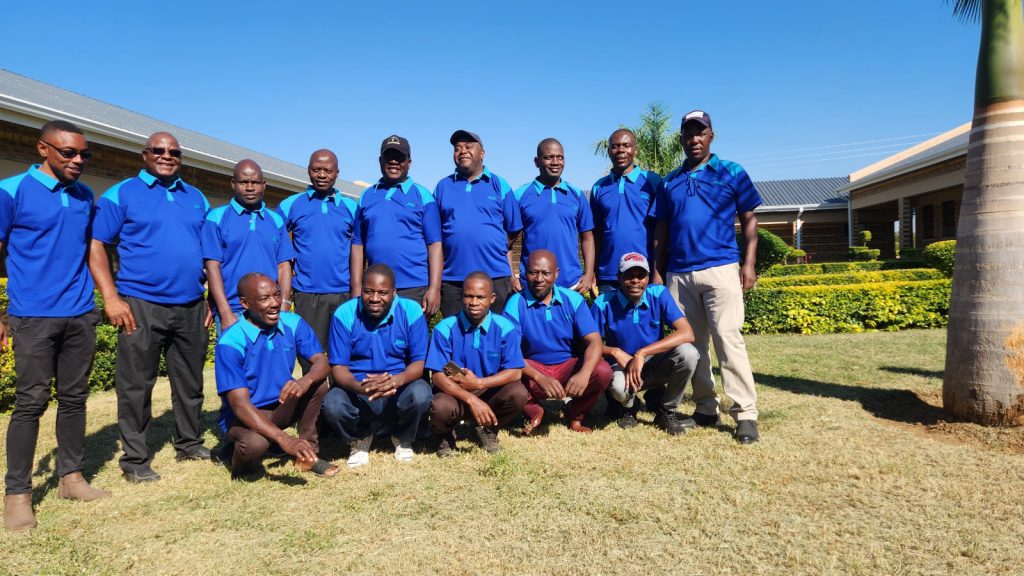ZULC Global Access Fund Grant
The Zimbabwe University Libraries Consortium (ZULC) won a grant courtesy of Datacite (https://datacite.org/). The grant information is available at https://datacite.org/global-access-fund/gaf2024outreach07/. The Global Access Fund (GAF) was established to enable organisations worldwide to make their research outputs discoverable. It is part of the DataCite Global Access Program (GAP) made possible by Grant 2022-316573 from the Chan Zuckerberg Initiative.
Project description
The project, led by the Zimbabwe University Libraries Consortium, seeks to create awareness of the importance of persistent identifiers when offering research data services in institutions of higher education in Zimbabwe. This will help to give the librarians an appreciation of the importance of persistent identifiers such as DOIs and ORCID when managing research data. As part of the project, a study is ongoing using ZULC as a case study to identify institutions that have established research data services. A workshop was done with those offering research data services including the librarians, researchers, ICT departments, and research offices in universities within ZULC.
On behalf of ZULC and its Directors, I wish to extend a warm welcome to all the participants from different institutions; I appreciate your presence at this workshop and your participation. I also want to acknowledge our distinguished guests, organizers, and sponsors of the workshop (DataCite).
ZULC is proud to host this important workshop on Persistent Identifiers (PID). This is an important workshop where we are gathered to share information on PIDs, Types of Persistent Identifiers, role of Persistent Identifiers in academic institutions, service providers, strategies and challenges of Persistent Identifiers, sharing of experiences and success stories and the way forward after this training. The collective aim of this workshop is to sharpen our skills in Persistent Identifiers. The workshop seeks to create awareness on the importance of persistent identifies when offering research data services in institutions of higher learning in Zimbabwe. This is a follow up project to the workshop that was done at Gwanda State University to create awareness on how to establish research data services. The workshop seeks to give librarians an appreciation of the importance of persistent identifiers such as DOIs and ORCID when managing research data.
I am sure that our workshop shall be successful and that the objectives that we have set out to achieve shall be accomplished.
⦁ Balance between presentations, discussions, and interactive activities.
⦁ Recognize the diverse backgrounds, experiences, and expertise that the attendees bring to the workshop.
⦁ Encourage active participation, collaboration, and the sharing of ideas throughout the event.
⦁ Express my appreciation for the attendees’ dedication and commitment to the library profession.
⦁ Encourage the participants to engage actively, ask questions, and make the most of the learning opportunity.
⦁ There a number lessons that you are going to learn from this workshop, let’s take the lessons back to our institutions and share as much as possible.
⦁ Let this workshop help us as librarians enhance our skills, knowledge, and practical capabilities.
I wish you a productive and engaging workshop. On this brief note I say again, welcome and I declare this workshop officially open and wish you fruitful deliberations.
Thank you,
Dr Rosemary Maturure
ZULC Chairperson.
Facilitators of the workshop

Bosun Obileye
Bosun Obileye is the Regional Engagement Specialist – Africa for DataCite. His career spans the institutionalization of open science from policy development, infrastructural development and implementation, advocacy, engagements and adoption. He has a background in Computer and Information Research Science, Information and Data Security, Research for Development (R4D), and Community Engagements. His interest in Identity and Access Management (IAM) is reflected in Persistent Identifiers (PIDs) as seen in his work with DataCite across sub-Saharan Africa where he engages, collaborates and promotes PIDs best practices and adoption.

Josiline Chigwada
Josiline is the principal investigator in the ZULC project. She is a postdoctoral research fellow at the University of South Africa (UNISA) with 18 years of experience in academic librarianship. She holds an Information Science doctorate from UNISA and a Postgraduate Diploma in Higher Education. She is a member of the Library and Information Association of South Africa (LIASA), SPARC Africa management committee, Zimbabwe Library Association (ZIMLA), Zimbabwe Rural School Libraries Initiative, Zimbabwe Young Academy of Science, Association for Information Science and Technology (ASIS&T), International Association of Social Science Information Service and Technology (IASSIST), and the Rotary Club of Msasa, Harare. She is a DataCite ambassador for Zimbabwe (https://datacite.org/datacite-ambassadors/).

Blessing Chiparausha
Blessing is University Librarian at Bindura University of Science Education, Zimbabwe. He is the Vice Chairperson of the Zimbabwe University Libraries Consortium. He is also serving as the Mashonaland Branch Vice Chairperson of the Zimbabwe Library Association. Blessing holds a PhD in Information Science from the University of South Africa.

Justice Kasiroori
Justice is a lecturer at the University of Zimbabwe in the Analytics and Informatics department. He has spent more than 12 years as a Systems Librarian and holds a Master of Science in Data Analytics and a Postgraduate Diploma in Tertiary Education. He is the technical person in the project.
ZULC PIDs train the trainer workshop report
As part of the Global Access Fund grant, the Zimbabwe University Libraries Consortium (ZULC) held a 2-day workshop for scholarly communication academic librarians to create awareness of persistent identifiers.

Group photo of the workshop attendees
Twenty-two librarians and four facilitators attended the workshop in Bindura on 24-25 April 2024. The programme consisted of the following topics:
⦁ Introductions and opening remarks
⦁ Introduction to DataCite
⦁ Introduction to persistent identifiers
⦁ Types of persistent identifiers
⦁ Hands-on session on persistent identifiers
⦁ Role of PIDs in academic institutions
⦁ Benefits of PIDs in scholarly communication
⦁ Strategies for promoting the adoption of PIDs among researchers
⦁ Challenges faced by academic libraries in implementing PIDs
⦁ Strategies for overcoming barriers related to PID adoption
⦁ Sharing experiences on success stories by participants
⦁ Resources for further learning and professional development
Action plan
The following steps were agreed upon:
⦁ Look at what PIDs are in place. If there is nothing, discuss with the research office and other stakeholders and agree on how to adopt and use PIDs.
⦁ Train other librarians so that they can roll out the training to their faculties.
⦁ Consider consortium membership on DataCite as ZULC.
⦁ Approach the research directorate and research ethics chairperson to implement PIDs.
⦁ To ensure that the journals published by ZULC members have DOIs to meet the standards and guidelines of publishing.
⦁ Bring representatives from the library schools when discussing these issues.
⦁ Offer guest lectures on persistent identifiers to library and information students.
⦁ To partner with institutions that have PIDs such as ROR registration.
⦁ Assist students in identifying supervisors who use persistent identifiers.
Based on the responses from the workshop participants, the event was a great success. The workshop was a significant step towards raising awareness of PIDs. In addition, the participants acknowledged that they had gained knowledge and skills that would empower them to train peers and researchers back at their institutions. Additionally, the workshop went a long way in ensuring that ZULC members collectively or individually subscribe for DOIs coupled with ORCID and ROR registration which in turn would elevate ZULC profile to match prevailing global standards.

